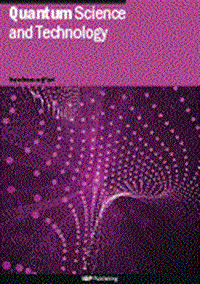A memristive neural decoder for cryogenic fault-tolerant quantum error correction
IF 5.6
2区 物理与天体物理
Q1 PHYSICS, MULTIDISCIPLINARY
引用次数: 0
Abstract
Neural decoders for quantum error correction rely on neural networks to classify syndromes extracted from error correction codes and find appropriate recovery operators to protect logical information against errors. Its ability to adapt to hardware noise and long-term drifts make neural decoders promising candidates for inclusion in a fault-tolerant quantum architecture. However, given their limited scalability, it is prudent that small-scale (local) neural decoders are treated as first stages of multi-stage decoding schemes for fault-tolerant quantum computers with millions of qubits. In this case, minimizing the decoding time to match the stabilization measurements frequency and a tight co-integration with the QPUs is highly desired. Cryogenic realizations of neural decoders can not only improve the performance of higher stage decoders, but they can minimize communication delays, and alleviate wiring bottlenecks. In this work, we design and analyze a neural decoder based on an in-memory computation (IMC) architecture, where crossbar arrays of resistive memory devices are employed to both store the synaptic weights of the neural decoder and perform analog matrix–vector multiplications. In simulations supported by experimental measurements, we investigate the impact of TiOx-based memristive devices’ non-idealities on decoding fidelity. We develop hardware-aware re-training methods to mitigate the fidelity loss, restoring the ideal decoder’s pseudo-threshold for the distance-3 surface code. This work provides a pathway to scalable, fast, and low-power cryogenic IMC hardware for integrated fault-tolerant quantum error correction.低温容错量子纠错记忆神经解码器
量子纠错神经解码器依靠神经网络对纠错码中提取的证候进行分类,并找到合适的恢复算子来保护逻辑信息不受错误的影响。它适应硬件噪声和长期漂移的能力使神经解码器成为容错量子架构的有希望的候选者。然而,考虑到其有限的可扩展性,谨慎的做法是将小规模(局部)神经解码器作为具有数百万量子位的容错量子计算机的多阶段解码方案的第一阶段。在这种情况下,最大限度地减少解码时间,以匹配稳定测量频率,并与qpu紧密协整。神经解码器的低温实现不仅可以提高高阶解码器的性能,而且可以最小化通信延迟,缓解布线瓶颈。在这项工作中,我们设计并分析了一个基于内存计算(IMC)架构的神经解码器,其中电阻存储器器件的交叉棒阵列用于存储神经解码器的突触权重并执行模拟矩阵向量乘法。在实验测量支持的模拟中,我们研究了基于tiox的记忆器件的非理想性对解码保真度的影响。我们开发了硬件感知的再训练方法来减轻保真度损失,为距离-3表面代码恢复理想解码器的伪阈值。这项工作为集成容错量子纠错的可扩展、快速和低功耗低温IMC硬件提供了一条途径。
本文章由计算机程序翻译,如有差异,请以英文原文为准。
求助全文
约1分钟内获得全文
求助全文
来源期刊

Quantum Science and Technology
Materials Science-Materials Science (miscellaneous)
CiteScore
11.20
自引率
3.00%
发文量
133
期刊介绍:
Driven by advances in technology and experimental capability, the last decade has seen the emergence of quantum technology: a new praxis for controlling the quantum world. It is now possible to engineer complex, multi-component systems that merge the once distinct fields of quantum optics and condensed matter physics.
Quantum Science and Technology is a new multidisciplinary, electronic-only journal, devoted to publishing research of the highest quality and impact covering theoretical and experimental advances in the fundamental science and application of all quantum-enabled technologies.
 求助内容:
求助内容: 应助结果提醒方式:
应助结果提醒方式:


